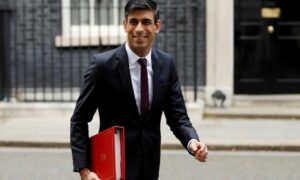Rishi Sunak will announce a multibillion-pound package of support for the economy in an attempt to avoid mass redundancies this winter.
The chancellor’s measures will include wage subsidies for part-time workers, VAT cuts and more loans for struggling businesses.
Mr Sunak will set out his “winter economy plan” in the Commons. It is expected to feature a German-style subsidy scheme in the government would help to pay the wages of people returning to work on a part-time basis.
The system is designed to encourage companies to keep on workers in viable jobs while ensuring that others are not retained in “zombie posts” that exist only because of the government’s furlough scheme, which ends on October 31. “There is a difficult trade-off between keeping people in jobs and helping them find new ones,” a Treasury source said.
Mr Sunak will also say that his plans for an autumn budget have been scrapped because of the resurgence of coronavirus. The government’s spending review, which sets budgets for Whitehall departments and local authorities, could also be reduced to one year, although an announcement is not likely to be made now.
The chancellor is also expected today to extend four loan schemes for businesses until the end of November and increase the terms of loans from six years to ten in a move that will sharply reduce monthly repayments. The schemes have already provided £53 billion worth of loans to companies.
There will be a series of measures to support sectors hardest hit by coronavirus restrictions. This year the government cut VAT for the hospitality and tourism industry to 5 per cent at a cost of £4 billion. The reduction was due to last until January but will be extended to the end of March.
Under the German kurzarbeit [short-working] scheme, employers pay the wages of staff while they are at work and the state covers 80 per cent of their wages when they are not. Ministers have been considering plans to subsidise the wages of employees who can work at least half of their normal hours. Companies would pick up the wages for hours covered by employees and the government would pay a third of their wages while they were not working. Employers would pay another third and employees would forgo a third.
The scheme would cost about £500 million a month against the £4 billion cost of the furlough scheme.
Mr Sunak has rejected calls to extend furlough payments amid concerns that doing so would hold people in jobs that were no longer viable. A report by the Institute for Government think tank has calculated the total cost of Covid-19 to the government so far at £317 billion, including £192 billion on support for businesses, the NHS, as well as the furlough scheme.
Labour has been putting ministers under increasing pressure to continue the furlough scheme. In an address to the nation last night Sir Keir Starmer, the party’s leader, said: “We need a Plan B for the economy. It makes no sense to bring in new restrictions at the same time as phasing out support for jobs and businesses.”
